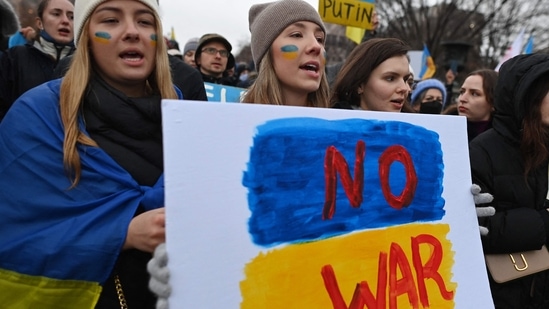Ukraine war: Does Russia care about sanctions? Measures that nations are taking
The United States, the United Kingdom, Japan, Taiwan, Australia, Canada and New Zealand were among the nations that announced fresh measures against Moscow.
Huge reprisals have followed after Russia decided to attack Ukraine on Thursday despite global pressure - the war has triggered fierce opposition worldwide. The United States, the United Kingdom, Japan, Taiwan, Australia, Canada and New Zealand were among the nations that announced fresh measures against Moscow within hours of the Ukraine onslaught. Ukrainian President Volodymyr Zelenskyy on Friday said the sanctions on Russia are not enough as the offensive continued for Day 2.

The United States
President Joe Biden has announced a series of fresh measures against Kremlin. He said Putin had a "sinister vision of the world" and a misguided dream of recreating the Soviet Union.
"This is a premeditated attack. Putin is the aggressor. Putin chose this war. And now he and his country will bear the consequences," the US President said at a White House briefing.
In the new sanctions, the US aims to target Russia's ability to do business in dollars, euros, pounds, and yen. Five major banks, including state-backed Sberbank and VTB, and Sberbank, Russia's largest lender, have been hit. Export curbs have also been announced on everything from commercial electronics and computers to semiconductors and aircraft parts.
Biden, however, has agreed that sanctions will not be enough to stop Putin. A White House official, however, pointed that out that the fresh measures are likely to isolate Russia financially.
UK:
British Prime Minister Boris Johnson has also declared export and financial curbs, with a ban on Russian airline Aeroflot over landing at UK airports. “Now we see him for what he is - a bloodstained aggressor who believes in imperial conquest," he said of Putin.
European Union:
The 27-bloc European Union has also promised "hard-hitting" measures. “We will weaken Russia’s economic base and its capacity to modernise," European Commission chief Ursula von der Leyen was quoted as saying in reports.
Canada and Australia:
Both countries have targeted Russian individuals who played a role in approving the attack on Ukraine, as well as key business figures. Australia has aimed sanctions at "oligarchs whose economic weight is of strategic significance to Moscow". Its Prime Minister, Scott Morrison, also slammed China for increasing wheat export to Moscow while other nations introduce punitive measures.
New Zealand:
Announcing targeted travel bans against Russian officials, Prime Minister Jacinda Ardern said: "An unthinkable number of innocent lives could be lost because of Russia’s decision."
Japan:
Japan has also banned trade with Ukraine's two rebel regions - declared independent by Russian President Vladimir Putin - and frozen their assets and visas. It is also heading to cut Russia's military funds. “Japan must clearly show its position that we will never tolerate any attempt to change the status quo by force," Prime Minister Fumio Kishida said.
It's yet to be seen, however, if Russia responds as intended to the punitive steps.
On Friday, attacks continued in Ukraine capital Kyviv while military strikes by Moscow resumed at around 4 am local time. Despite huge criticism worldwide, Russia has refused to show signs that it will stop immediately.
On Thursday, Putin had dared the west with "worst global consequences ever" if it intervened amid Ukraine war.
“As for military affairs, even after the dissolution of the USSR and losing a considerable part of its capabilities, today's Russia remains one of the most powerful nuclear states. Moreover, it has a certain advantage in several cutting-edge weapons. In this context, there should be no doubt for anyone that any potential aggressor will face defeat and ominous consequences should it directly attack our country," he said in his pre-invasion address on Thursday.
However, some experts have said Russia's formidable finances may crumble eventually with increasing global pressure.
Presently, the country has $643 billion in currency reserves and booming oil and gas revenues, Reuters said in a report.
(With inputs from Reuters, AFP, AP)






